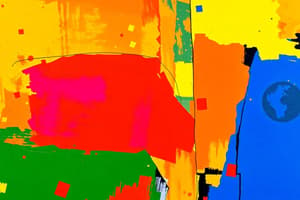Podcast
Questions and Answers
What is copyright?
What is copyright?
A collection of all rights enjoyed by the owner of an artistic or literary work.
What are considered copyrightable works in the Philippines? (Select all that apply)
What are considered copyrightable works in the Philippines? (Select all that apply)
- Telemetry data
- Official texts of legislative nature
- Musical compositions (correct)
- Books and articles (correct)
Copyright protection covers ideas and procedures.
Copyright protection covers ideas and procedures.
False (B)
Is a copyright registration necessary to protect artistic or literary works?
Is a copyright registration necessary to protect artistic or literary works?
Who can apply for a copyright registration?
Who can apply for a copyright registration?
The author or creator can waive or transfer copyright.
The author or creator can waive or transfer copyright.
What is the duration of copyright protection in the Philippines?
What is the duration of copyright protection in the Philippines?
Who are considered owners of the copyrightable works? (Select all that apply)
Who are considered owners of the copyrightable works? (Select all that apply)
Flashcards are hidden until you start studying
Study Notes
Copyright in the Philippines
- Copyright protects original creations in the literary and artistic domain.
Copyrightable Works
- Books, pamphlets, articles, periodicals, newspapers, lectures, sermons, addresses, letters, dramatic or musical compositions, choreographic works, musical compositions, drawings, paintings, architecture, sculpture, engravings, lithographs, models or designs for works of art, original ornamental designs, illustrations, maps, plans, sketches, charts, three-dimensional works related to geography, topography, architecture, or science, drawings or plastic works of a scientific or technical character, photographic works, lantern slides, audiovisual works, cinematographic works, pictorial illustrations, advertisements, and computer programs are all protected by copyright.
Works Not Protected by Copyright
- Ideas, procedures, systems, concepts, principles, discoveries, and mere data are not protected by copyright.
- News of the day and miscellaneous facts considered press information are not protected.
- Official texts of a legislative, administrative, or legal nature are not protected.
- Works of the Philippine Government are not protected unless specifically approved by the appropriate government agency.
- Statutes, rules, regulations, speeches, lectures, sermons, addresses, and dissertations delivered in courts of justice, administrative agencies, deliberative assemblies, and public meetings are not protected.
Copyright Protection
- Copyright protection begins from the moment of creation, registration is not required.
- The owner of the work, their assignees, or successors-in-interest can apply for registration.
Ownership of Copyrightable Works
- The author is the original owner.
- Co-authors are joint owners and their rights are governed by co-ownership rules.
- The employer owns the work if it is created as part of the employee's regular duties, unless otherwise agreed upon.
- If the work was commissioned, the commissioner and the author/creator jointly own it, but the copyright belongs to the author/creator, unless otherwise agreed upon.
- In audiovisual works, the producer, scenario author, music composer, film director, and work adapter all share copyright.
- Letters are owned by the writer, but the recipient can authorize publication or dissemination with the writer's consent or if public goods or justice require it.
Waiver or Transfer of Copyright
- The author/creator can waive or transfer copyright to a corporation or individual.
Duration of Copyright Protection
- Copyright protection lasts for the author's lifetime plus 50 years after their death.
- This applies to posthumous works.
- In joint authorship, economic rights are protected for the lifetime of the last surviving author plus 50 years after their death.
Studying That Suits You
Use AI to generate personalized quizzes and flashcards to suit your learning preferences.




